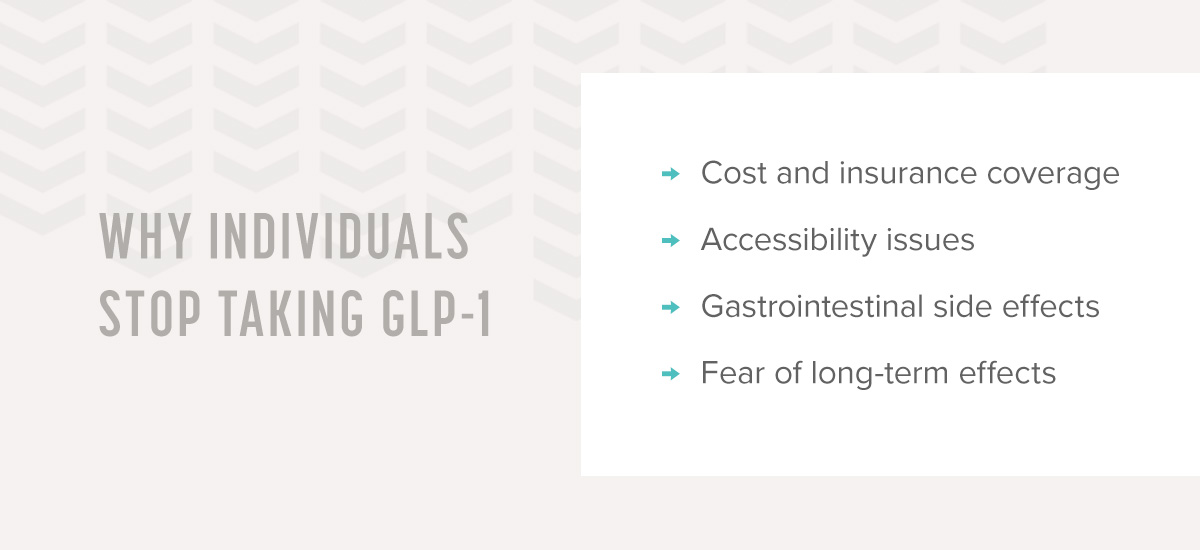Glucagon-like peptide-1 (GLP-1) medications like semaglutide and tirzepatide, with brands such as Ozempic and Mounjaro, designed for diabetes, and Wegovy and Zepbound, designed for weight loss, have been soaring in popularity due to their effectiveness as weight loss aids. While many people lose weight when taking these drugs, a large number regain it after stopping. A 2022 study found that individuals gained two-thirds of the weight they lost a year after stopping 2.4 mg of semaglutide, the maximum dose. Discontinuing tirzepatide resulted in a similar amount of weight regain.
Thankfully, there are methods patients can use to sustain their weight loss results and achieve a healthier lifestyle. Learn what happens when you stop GLP-1, how to manage weight loss after GLPs, and effective, long-term options for losing and keeping weight off.
How GLP-1 Medications Work in the Body
GLP-1 medications work by binding to and activating receptors in the body. More specifically, semaglutide and tirzepatide activate the GLP-1 receptor, promoting downstream pathways that are important for appetite regulation, insulin sensitivity and metabolism. This stimulation slows the stomach emptying process, causing individuals to feel full for longer, eat less overall and lose weight.
Similar to medications for chronic conditions, like asthma, diabetes or high blood pressure, GLP-1 medications only work for those who continue to take them. Obesity should be treated like a chronic disease, and patients must continue the medication long-term to sustain the results achieved from the medication.
What Happens When You Stop Taking GLP-1 Medications Like Ozempic, Wegovy, Mounjaro or Zepbound?
Once the semaglutide or tirzepatide leaves the system, weight loss might only be temporary. The body can no longer rely on the drug to reduce appetite, slowing the metabolism and causing the hunger hormone to kick back in, causing weight regain. Withdrawal symptoms can also occur when individuals stop taking GLP-1 medications:
- Reduced side effects: While semaglutide or tirzepatide can lead to side effects like acid reflux, nausea, constipation and abdominal pain, stopping the medication can reduce these side effects. If symptoms continue, patients should consult with their doctor.
- Increased appetite: Without the semaglutide or tirzepatide slowing digestion, patients will not feel full for as long as they did while taking the medication. Increased appetite can lead to binge eating and weight gain.
- Increased blood glucose levels: Since Ozempic and Mounjaro are designed to regulate blood glucose levels for patients with Type 2 diabetes, blood sugar can rise after stopping these medications. Diabetic patients have reported experiencing worsening blood sugar spikes and higher blood sugar levels than before they started taking the drug.
- Weight regain: When a person stops taking GLP-1 medications, the side effects of appetite suppression tend to go away, making weight gain common. For this reason, many people who take GLP-1s also need to take additional lifestyle measures to reduce the likelihood of regaining weight after stopping the medication.
While GLP-1 medications are meant for long-term use, this is not always feasible for every patient. Even though it is not recommended, people often stop taking GLP-1 drugs for various reasons, causing them to regain the weight they lost with the medication.
Why Individuals Stop Taking GLP-1

People might stop taking GLP-1 medications for several reasons, from cost issues to trouble accessing medication. The tolerability of GLP-1 drugs can also pose a challenge, as gastrointestinal issues like nausea, vomiting, diarrhea and constipation can occur from taking them.
- Cost and insurance coverage: Cost is one of the most significant barriers to continuing to use Ozempic and other weight loss medications. They can be expensive, and not all insurance plans provide coverage, causing patients to stop taking them.
- Accessibility issues: With the popularity of weight loss medications today, people may struggle to refill their prescriptions and receive them on time because of widespread shortages, high demand exceeding supply and limited availability at pharmacies.
- Gastrointestinal side effects: While some patients may tolerate gastrointestinal side effects initially, they can become overwhelming, prompting individuals to stop taking the medication.
- Fear of long-term effects: Given the ongoing discussions about risks in the medical community, some patients may have concerns about the long-term impact of GLP-1 medications, including dangerous adverse reactions as described on the FDA warning label, like acute kidney injury and hypoglycemia. These concerns can deter them from continuing treatment.
How to Reduce the Risk of Weight Regain After Stopping GLP-1s
When stopping GLP-1s, patients should work with health care professionals to reduce the risk of weight regain. Specific lifestyle changes can help individuals stay healthy and keep the weight off:
Dose Tapering
While patients can stop taking GLP-1s without serious side effects, it is critical to wean off the medication rather than stop taking it suddenly. This approach allows the body to adjust and can help mitigate potential rebound weight gain while transitioning to a medication-free lifestyle.
Changing Medications
Transitioning to alternative weight management medications can also be beneficial. Discussing options with a health care provider can help find better alternatives that align with the patient’s health goals, such as controlling appetite or improving metabolic health. Many patients will start out taking semaglutide, and then later switch to tirzepatide when the semaglutide is no longer effective.
Lifestyle Changes
While weight loss is not permanent after stopping GLP-1s, healthier lifestyle changes can manage a patient’s long-term weight. This includes getting enough exercise, eating a diet rich in protein and fiber and making behavioral changes that promote better eating habits. Regular check-ins with health care professionals can support these efforts.
Effective Weight Loss Alternatives
Though it is common to experience weight gain after stopping Ozempic, Wegovy, Mounjaro and Zepbound, several alternatives can help patients lose and keep it off longer term. Bariatric surgery is effective for substantial and sustained weight loss in those with obesity, as it can lead to significant and lasting changes in weight and overall health. Patients typically experience 35-50% total body weight loss with bariatric surgery and can continue to enjoy a wide variety of foods.
Why Trust Center for Weight Loss Surgery
At the Center for Weight Loss Surgery, we understand that obesity is a chronic disease, and there is no one-size-fits-all solution. Our commitment is to deliver innovative, minimally invasive weight loss solutions, tailoring our approach to each patient’s individual needs and goals.
We offer advanced bariatric surgical options, including da® Vinci robot-assisted and laparoscopic bariatric weight loss surgeries, and have a long-standing history of providing compassionate, comprehensive care. We have decades of experience and were one of the first practices in the Pacific Northwest to be recognized for excellent outcomes post-bariatric surgery.
Check out our patient success stories to see the difference our treatments can make in your life.
Schedule a Consultation at the Center for Weight Loss Surgery
It can be challenging not to gain weight after stopping Ozempic, Wegogy, Mounjaro, Zepbound and other GLP-1s, but several alternatives can be more effective in the long term. At the Center for Weight Loss Surgery, we provide surgical and nonsurgical weight loss treatments to help you look and feel your best. Bariatric surgery is an example that can deliver long-term weight loss results, helping to treat obesity and get you started toward a happier, healthier lifestyle.
During your consultation, we will help determine the best option for your health and weight loss goals. Our team will educate you on the best options and provide life-long comprehensive post-surgery care and support. To get started, schedule an in-person or virtual consultation with us today.





